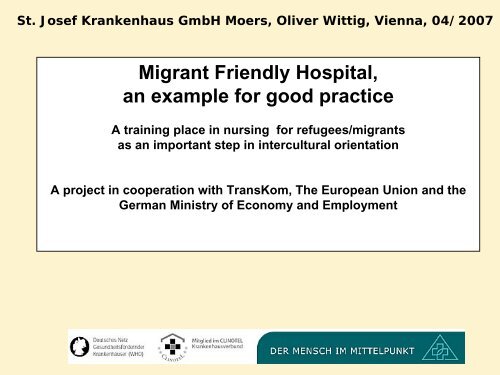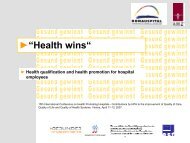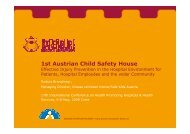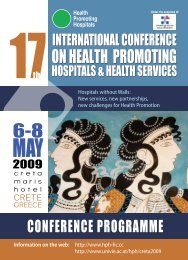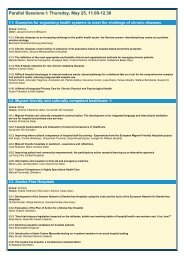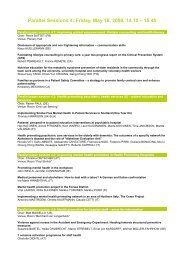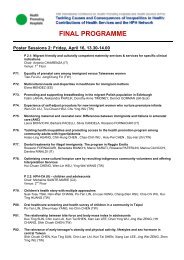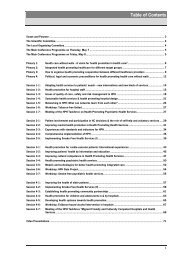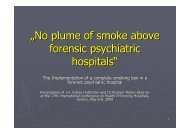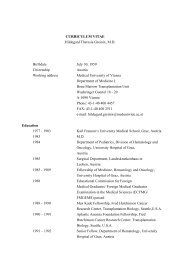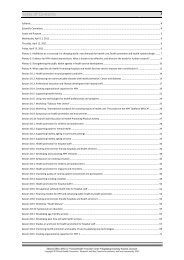Migrant Friendly Hospital A training place in nursing for refugees ...
Migrant Friendly Hospital A training place in nursing for refugees ...
Migrant Friendly Hospital A training place in nursing for refugees ...
You also want an ePaper? Increase the reach of your titles
YUMPU automatically turns print PDFs into web optimized ePapers that Google loves.
St. Josef Krankenhaus GmbH Moers, Oliver Wittig, Vienna, 04/2007<br />
<strong>Migrant</strong> <strong>Friendly</strong> <strong>Hospital</strong>,<br />
an example <strong>for</strong> good practice<br />
A <strong>tra<strong>in</strong><strong>in</strong>g</strong> <strong>place</strong> <strong>in</strong> nurs<strong>in</strong>g <strong>for</strong> <strong>refugees</strong>/migrants<br />
as an important step <strong>in</strong> <strong>in</strong>tercultural orientation<br />
A project <strong>in</strong> cooperation with TransKom, The European Union and the<br />
German M<strong>in</strong>istry of Economy and Employment
St. Josef Krankenhaus GmbH Moers, Oliver Wittig, Vienna, 04/2007<br />
St. Josef <strong>Hospital</strong> Ltd Moers
St. Josef Krankenhaus GmbH Moers, Oliver Wittig, Vienna, 04/2007<br />
Board of directors:<br />
He<strong>in</strong>rich Röwer<br />
Manag<strong>in</strong>g director<br />
Dr. med. Thomas Ziegenfuß<br />
Medical director<br />
Klaus Armonies<br />
Technical director<br />
Oliver Wittig<br />
Nurs<strong>in</strong>g manager<br />
Chairman of the supervisory board<br />
Pfarrer (Reverend) He<strong>in</strong>rich Bücker
St. Josef Krankenhaus GmbH Moers, Oliver Wittig, Vienna, 04/2007<br />
Facts and numbers<br />
F<strong>in</strong>ancial volume of the St. Josef Krankenhaus GmbH per year 55 million Euro<br />
Number of employees 1150<br />
Number and distribution of <strong>tra<strong>in</strong><strong>in</strong>g</strong> <strong>place</strong>s:<br />
30 <strong>tra<strong>in</strong><strong>in</strong>g</strong> <strong>place</strong>s <strong>in</strong> nurs<strong>in</strong>g (the <strong>tra<strong>in</strong><strong>in</strong>g</strong> takes <strong>place</strong> <strong>in</strong> co-operation with the nurs<strong>in</strong>g school<br />
at the St. Bernhard <strong>Hospital</strong> <strong>in</strong> Kamp L<strong>in</strong>t<strong>for</strong>t)<br />
2 <strong>tra<strong>in</strong><strong>in</strong>g</strong> <strong>place</strong>s <strong>in</strong> old person care,<br />
4 <strong>tra<strong>in</strong><strong>in</strong>g</strong> <strong>place</strong>s <strong>in</strong> the adm<strong>in</strong>istration<br />
The St. Josef Krankenhaus GmbH is member of the Cl<strong>in</strong>otel hospital group.<br />
The St. Josef Krankenhaus is member of the Network of Health-Promot<strong>in</strong>g <strong>Hospital</strong>s<br />
of the WHO.<br />
The St. Josef Krankenhaus GmbH is member of the transnational group Euregio<br />
Rh<strong>in</strong>e- Waal‘.
St. Josef Krankenhaus GmbH Moers, Oliver Wittig, Vienna, 04/2007<br />
Overview<br />
475 beds <strong>in</strong> the general hospital<br />
116 treatment <strong>place</strong>s <strong>in</strong> the residential home <strong>for</strong> the elderly<br />
100 beds acute rehabilitation<br />
20 treatment <strong>place</strong>s on the geriatric day ward<br />
25 beds on the short term ward<br />
12 treatment <strong>place</strong>s on the day ward<br />
7 beds <strong>in</strong> our hospice<br />
-------------------------------------------------<br />
= 755 beds and treatment <strong>place</strong>s alltogether<br />
+ Mobile nurs<strong>in</strong>g<br />
+ Plann<strong>in</strong>g and construction management Ltd
St. Josef Krankenhaus GmbH Moers, Oliver Wittig, Vienna, 04/2007<br />
1. Sociodemographical facts<br />
The Project<br />
2. The <strong>in</strong>fluence of the migration on the health<br />
3. Healthcare <strong>for</strong> migrants<br />
4. Manag<strong>in</strong>g Diversity<br />
5. Important po<strong>in</strong>ts of the <strong>in</strong>terkultural orientation of health- and social <strong>in</strong>stitutions<br />
6. Recognition of the traps of communication<br />
7. Start<strong>in</strong>g po<strong>in</strong>t lead<strong>in</strong>g modell<br />
8. Start<strong>in</strong>g po<strong>in</strong>t Integration<br />
9. Start<strong>in</strong>g po<strong>in</strong>t Tra<strong>in</strong><strong>in</strong>g<br />
10. Realisation<br />
11. Outcome<br />
12. The next steps
St. Josef Krankenhaus GmbH Moers, Oliver Wittig, Vienna, 04/2007<br />
1. Sociodemographical facts<br />
• S<strong>in</strong>ce 1950 15 Mill. people came from other countries to germany<br />
• 2004: 6,7 Mill. <strong>for</strong>eign people live <strong>in</strong> germany<br />
•1,8 Mill. Turkish, 35% were born <strong>in</strong> germany<br />
•Ca. 1 Mill. <strong>refugees</strong>, 140000 of them don‘t know how sure their stay <strong>in</strong><br />
germany is.<br />
• Ca. 800000 are over 60 years old migrants
St. Josef Krankenhaus GmbH Moers, Oliver Wittig, Vienna, 04/2007<br />
2. The <strong>in</strong>fluence of migration on health<br />
• Health Risks: M<strong>in</strong>ority Status, Social Barriers, Psycho-social Difficulties<br />
• <strong>Migrant</strong>s br<strong>in</strong>g both, higher and lower risks <strong>for</strong> special diseases and keep them<br />
• Family and ethnic orientation can be a health resource.
St. Josef Krankenhaus GmbH Moers, Oliver Wittig, Vienna, 04/2007<br />
• Low vax<strong>in</strong>ation rate with children.<br />
• High maternity death rate.<br />
3. Healthcare <strong>for</strong> migrants<br />
• <strong>Migrant</strong>s are us<strong>in</strong>g more often emergency ambulances.<br />
• Barriers because of language- and <strong>in</strong><strong>for</strong>mation problems. Different po<strong>in</strong>ts<br />
of view on different diseases.<br />
• Besides that there is only little data on the health status of migrants and<br />
<strong>refugees</strong>.
St. Josef Krankenhaus GmbH Moers, Oliver Wittig, Vienna, 04/2007<br />
4. Manag<strong>in</strong>g Diversity<br />
• Differences are normal and not exceptional!<br />
• If diversity is recognized and effectively managed, it can be a positive<br />
potential <strong>for</strong> the organisation.<br />
• „Only some diversity is not possible“ (Maria Schwarz-Wölzl, Wien 2005)
St. Josef Krankenhaus GmbH Moers, Oliver Wittig, Vienna, 04/2007<br />
5. Important po<strong>in</strong>ts of the <strong>in</strong>terkultural orientation of<br />
health- and social <strong>in</strong>stitutions<br />
• Same entrance possibility <strong>for</strong> migrants to all healthcare services. (also<br />
preventive and health promot<strong>in</strong>g)<br />
• Development of effetive structures that are orientated on the life and needs.<br />
• Same entrance possibility <strong>for</strong> migrants to jobs and employment. Same<br />
career opportunities.<br />
• Development of equal team structures. Us<strong>in</strong>g the diversity <strong>for</strong> synergy<br />
effects. Recogniz<strong>in</strong>g different problem def<strong>in</strong>itions and solution strategies.<br />
• Increas<strong>in</strong>g <strong>in</strong>tercultural competence of all employees.
St. Josef Krankenhaus GmbH Moers, Oliver Wittig, Vienna, 04/2007<br />
6. Recognition of the traps of communication :<br />
Members of the majority population<br />
• Arrogance<br />
• Idealization<br />
• Devaluation<br />
• Blam<strong>in</strong>g maladaptation <strong>for</strong> communication problems<br />
• Exclusion
St. Josef Krankenhaus GmbH Moers, Oliver Wittig, Vienna, 04/2007<br />
• Overreaction<br />
Recognition of the traps of communication :<br />
Members of the m<strong>in</strong>ority population<br />
• Blam<strong>in</strong>g the ignorance and arrogance of the majority <strong>for</strong> communication<br />
problems<br />
• High expectations to the majority and their understand<strong>in</strong>g.
St. Josef Krankenhaus GmbH Moers, Oliver Wittig, Vienna, 04/2007<br />
7. Start<strong>in</strong>g po<strong>in</strong>t lead<strong>in</strong>g model<br />
• Creat<strong>in</strong>g a guidel<strong>in</strong>e <strong>for</strong> anti discrim<strong>in</strong>ation and the <strong>in</strong>tercultural open<strong>in</strong>g as a<br />
common standard <strong>for</strong> everyone and every unit <strong>in</strong> the organisation.
St. Josef Krankenhaus GmbH Moers, Oliver Wittig, Vienna, 04/2007<br />
8. Start<strong>in</strong>g po<strong>in</strong>t Penetration<br />
• The realisation of the aim „equality of migrants and <strong>in</strong>tercultural open<strong>in</strong>g“<br />
should be established <strong>in</strong> all areas of work and on all levels of the<br />
organisation. It is a managment task.
St. Josef Krankenhaus GmbH Moers, Oliver Wittig, Vienna, 04/2007<br />
9. Start<strong>in</strong>g po<strong>in</strong>t Tra<strong>in</strong><strong>in</strong>g<br />
• The organisation wants to proof that young migrants can be successfully<br />
<strong>in</strong>tegrated and qualified <strong>in</strong> a professional <strong>tra<strong>in</strong><strong>in</strong>g</strong>.
St. Josef Krankenhaus GmbH Moers, Oliver Wittig, Vienna, 04/2007<br />
10. Realisation<br />
• At March, 4th 2006 a young migrant started a professional <strong>tra<strong>in</strong><strong>in</strong>g</strong> <strong>in</strong><br />
nurs<strong>in</strong>g at St. Josef <strong>Hospital</strong> Moers.<br />
• The practical <strong>tra<strong>in</strong><strong>in</strong>g</strong> is held <strong>in</strong> St. Josef <strong>Hospital</strong> Moers<br />
• The theoretical <strong>tra<strong>in</strong><strong>in</strong>g</strong> is realized by TransKom <strong>in</strong> the Tra<strong>in</strong><strong>in</strong>g Institute <strong>for</strong><br />
Healthcare Professions (BIG) <strong>in</strong> Essen <strong>for</strong> 22 migrants (from different<br />
hospitals)
St. Josef Krankenhaus GmbH Moers, Oliver Wittig, Vienna, 04/2007<br />
Realisation<br />
• The tra<strong>in</strong>ees are supported <strong>in</strong> all adm<strong>in</strong>istrative questions and problems with<br />
authorities and also <strong>in</strong> questions of the <strong>tra<strong>in</strong><strong>in</strong>g</strong> and <strong>in</strong> case of familiar problems<br />
by a social worker.<br />
• There are meet<strong>in</strong>gs with all tra<strong>in</strong>ers of the participat<strong>in</strong>g hospitals to discuss the<br />
level of <strong>tra<strong>in</strong><strong>in</strong>g</strong>, the life circumstances of the tra<strong>in</strong>ees and questions of<br />
<strong>in</strong>tercultural competence <strong>in</strong> nurs<strong>in</strong>g.<br />
• BIG is support<strong>in</strong>g the learn<strong>in</strong>g by tra<strong>in</strong>ee-specific case discussions.
St. Josef Krankenhaus GmbH Moers, Oliver Wittig, Vienna, 04/2007<br />
11. Outcome<br />
• The <strong>Hospital</strong> aims to prove that young migrants can be successfully<br />
<strong>in</strong>tegrated and qualified by a professional <strong>tra<strong>in</strong><strong>in</strong>g</strong>.<br />
• 8 out of 22 tra<strong>in</strong>ees broke up the <strong>tra<strong>in</strong><strong>in</strong>g</strong>.<br />
•Reasons: health problems, problems <strong>in</strong> the family, problems <strong>in</strong> the trial<br />
period<br />
• The tra<strong>in</strong>ee <strong>in</strong> the St. Josef <strong>Hospital</strong> Moers could end the <strong>tra<strong>in</strong><strong>in</strong>g</strong><br />
successfully. She contributed to the <strong>in</strong>tercultural orientation of the hospital.
St. Josef Krankenhaus GmbH Moers, Oliver Wittig, Vienna, 04/2007<br />
12. The next steps<br />
• Develop<strong>in</strong>g more <strong>tra<strong>in</strong><strong>in</strong>g</strong> possibilities and support the possibilities <strong>for</strong><br />
employment <strong>for</strong> young asylum seekers and <strong>refugees</strong> <strong>in</strong> the healthcare and<br />
social sector.<br />
• Develop<strong>in</strong>g the <strong>in</strong>tercultural orientation <strong>in</strong> social and healthcare work<strong>in</strong>g<br />
<strong>place</strong>s.<br />
• Improvement of healthcare support and social services <strong>for</strong> <strong>refugees</strong>, asylum<br />
seekers and migrants.
St. Josef Krankenhaus GmbH Moers, Oliver Wittig, Vienna, 04/2007<br />
Thank you <strong>for</strong> your attention<br />
Oliver Wittig<br />
more Info:<br />
www.st-josef-moers.de<br />
www.transkom.de


